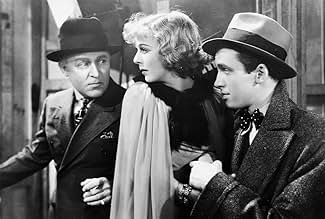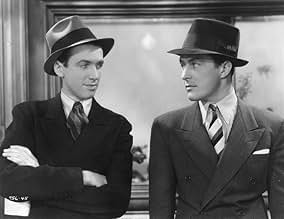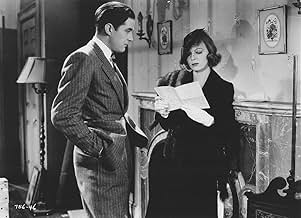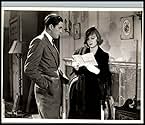PUNTUACIÓN EN IMDb
6,4/10
719
TU PUNTUACIÓN
La relación de una joven pareja casada se vuelve tensa cuando él es asignado al extranjero como corresponsal en el extranjero y ella se convierte en una importante estrella del escenario.La relación de una joven pareja casada se vuelve tensa cuando él es asignado al extranjero como corresponsal en el extranjero y ella se convierte en una importante estrella del escenario.La relación de una joven pareja casada se vuelve tensa cuando él es asignado al extranjero como corresponsal en el extranjero y ella se convierte en una importante estrella del escenario.
- Dirección
- Guión
- Reparto principal
- Premios
- 3 premios en total
Ray Milland
- Tommy Abbott
- (as Raymond Milland)
Ronnie Cosby
- Kit
- (as Ronald Cosbey)
Arthur Aylesworth
- Secretary
- (sin acreditar)
King Baggot
- Character man
- (sin acreditar)
Tommy Bond
- Pesky Kid
- (sin acreditar)
Harry C. Bradley
- Desk Clerk
- (sin acreditar)
Tyler Brooke
- Author
- (sin acreditar)
Daisy Bufford
- Maid
- (sin acreditar)
Jack Cheatham
- Taxi Driver
- (sin acreditar)
Jack Daley
- Conductor
- (sin acreditar)
John Dilson
- Stage Manager
- (sin acreditar)
Charles Fallon
- Prof. Dindet
- (sin acreditar)
Reseñas destacadas
Sight unseen this movie has a number of factors in its favor: 1) it stars two of the most charismatic performers of Hollywood's Golden Age, James Stewart & Margaret Sullavan, paired for the first time; 2) it features the underrated Ray Milland as Jimmy's best friend, who becomes the third player in their romantic triangle; 3) several of Hollywood's familiar character actors appear in supporting roles (Grant Mitchell, Hattie McDaniel, Christian Rub, etc.), and 4) its story was born in the typewriter of the legendary Preston Sturges, one of the all-time great screenwriters. According to various biographies of Sturges he spent a couple of weeks on the first draft of this drama while simultaneously cranking out a comedy for Carole Lombard called Love Before Breakfast. Sturges' script for Next Time We Love was then handed off to an obscure writer named Melville Baker who revised it, but in the end only Baker received screen credit. It would appear that this project meant little to Sturges, but, bearing in mind the memorable results when Margaret Sullavan took the title role of his brilliant adaptation of The Good Fairy in 1935, I sat down to watch this one hoping it might also be something special.
Unfortunately, and despite a decent opening half-hour or so, this film ultimately disappoints. Stewart and Sullavan have good chemistry and make a believable couple. We follow the course of their relationship with interest as they marry on impulse and Stewart aggressively pursues a career in journalism while Sullavan takes a more casual interest in stage acting, while best friend Milland maintains a steady presence in the background. Stewart & Sullavan have a baby, but trouble soon develops: her career in the theater suddenly takes off just as his progress at the newspaper hits a brick wall. Tension mounts as she becomes the breadwinner after he screws up a major assignment and is fired. They separate, and Sullavan flourishes while Stewart avoids coming home and stays out of the picture. Milland, at this point, finally steps forward and makes his feelings known.
More plot twists come along, but for me the movie starts to fizzle along about the time Sullavan's acting career takes off. Important events occur too abruptly, without the appropriate build-up: all of a sudden, she's a famous and powerful Broadway star. It looks as if some backstage scenes were filmed but then cut, suggested by the fact that Grant Mitchell, who plays a theatrical producer, receives fourth billing in the credits though he appears in only one brief scene. From that point onward Sullavan's stardom seems unreal while the behavior of Stewart's character becomes increasingly melodramatic and unbelievable. In the later scenes none of the main characters behave like recognizable human beings, and despite the best efforts of these estimable actors we no longer buy anything they're saying or doing by the climax. The story raises a provocative issue, i.e. the conflict that results when a wife earns more money than her husband and thus wields more power, but the filmmakers chickened out without really addressing the matter, choosing a sappy "Hollywood" resolution over anything genuinely satisfying.
Next Time We Love is fairly interesting nonetheless, worth seeing if you enjoy Hollywood melodramas of the '30s and certainly if you're a fan of the stars, but in the end it doesn't amount to much. Fans of Preston Sturges will be hard pressed to recognize his contribution, and may prefer to skip this one and enjoy one of his more characteristic works instead.
Unfortunately, and despite a decent opening half-hour or so, this film ultimately disappoints. Stewart and Sullavan have good chemistry and make a believable couple. We follow the course of their relationship with interest as they marry on impulse and Stewart aggressively pursues a career in journalism while Sullavan takes a more casual interest in stage acting, while best friend Milland maintains a steady presence in the background. Stewart & Sullavan have a baby, but trouble soon develops: her career in the theater suddenly takes off just as his progress at the newspaper hits a brick wall. Tension mounts as she becomes the breadwinner after he screws up a major assignment and is fired. They separate, and Sullavan flourishes while Stewart avoids coming home and stays out of the picture. Milland, at this point, finally steps forward and makes his feelings known.
More plot twists come along, but for me the movie starts to fizzle along about the time Sullavan's acting career takes off. Important events occur too abruptly, without the appropriate build-up: all of a sudden, she's a famous and powerful Broadway star. It looks as if some backstage scenes were filmed but then cut, suggested by the fact that Grant Mitchell, who plays a theatrical producer, receives fourth billing in the credits though he appears in only one brief scene. From that point onward Sullavan's stardom seems unreal while the behavior of Stewart's character becomes increasingly melodramatic and unbelievable. In the later scenes none of the main characters behave like recognizable human beings, and despite the best efforts of these estimable actors we no longer buy anything they're saying or doing by the climax. The story raises a provocative issue, i.e. the conflict that results when a wife earns more money than her husband and thus wields more power, but the filmmakers chickened out without really addressing the matter, choosing a sappy "Hollywood" resolution over anything genuinely satisfying.
Next Time We Love is fairly interesting nonetheless, worth seeing if you enjoy Hollywood melodramas of the '30s and certainly if you're a fan of the stars, but in the end it doesn't amount to much. Fans of Preston Sturges will be hard pressed to recognize his contribution, and may prefer to skip this one and enjoy one of his more characteristic works instead.
This is a very progressive film with themes way ahead of the times even for today. What does that mean? Usually when someone calls a film "progressive" it means it's hypersexed, banned by the Pope or has gratuitous shots of belly buttons. Right, well, none of that. NEXT TIME WE LOVE is progressive because it delves into interpersonal issues that simply "didn't exist" in the golden age of Hollywood.
A wife who chooses career over family? Preposterous. A husband/father who neglects the upbringing of his child? Outrageous. A marriage that is mutually tolerant of infidelity? Sacrilegious. Hollywood has historically depicted the marriage ceremony as the proverbial "happily ever after"; yet in this film we get a sober and realistic view of how life really works.
There are no dramatic fireworks, no cartoonish liaisons, no screaming or breaking things like we might get in a modern film dealing with this subject. Instead, it's extremely subtle and believable. There's not much flashy plot to sink your MTV-starved mind into, but if instead you like to digest your films slowly and comprehend the meaning behind every gesture--the tension in Margaret Sullivan's spine, the repressed torment in Jimmy Stewart's posture, the way a cigarette can be worth a thousand words when lit at the perfect moment--then this film is for you.
One thing worth mentioning... this is one of the few films that handles the aging of characters in a credible manner. Margaret goes from a giddy schoolgirl to a mature woman of the world. Jimmy goes from a brash adventurer to a pensive introvert. The makeup, hairstyles, clothes and especially the way the actors carry themselves convey the passage of time as the film progresses over a decade (perhaps mirroring the awakening of a nation from the roaring 20s to the tougher times that followed). The climactic hotel meeting near the end of the film presents two completely different personalities from what we originally met; you could almost believe that it was played by two new actors, but no, we owe it all to the fantastic acting & direction of this film.
A wife who chooses career over family? Preposterous. A husband/father who neglects the upbringing of his child? Outrageous. A marriage that is mutually tolerant of infidelity? Sacrilegious. Hollywood has historically depicted the marriage ceremony as the proverbial "happily ever after"; yet in this film we get a sober and realistic view of how life really works.
There are no dramatic fireworks, no cartoonish liaisons, no screaming or breaking things like we might get in a modern film dealing with this subject. Instead, it's extremely subtle and believable. There's not much flashy plot to sink your MTV-starved mind into, but if instead you like to digest your films slowly and comprehend the meaning behind every gesture--the tension in Margaret Sullivan's spine, the repressed torment in Jimmy Stewart's posture, the way a cigarette can be worth a thousand words when lit at the perfect moment--then this film is for you.
One thing worth mentioning... this is one of the few films that handles the aging of characters in a credible manner. Margaret goes from a giddy schoolgirl to a mature woman of the world. Jimmy goes from a brash adventurer to a pensive introvert. The makeup, hairstyles, clothes and especially the way the actors carry themselves convey the passage of time as the film progresses over a decade (perhaps mirroring the awakening of a nation from the roaring 20s to the tougher times that followed). The climactic hotel meeting near the end of the film presents two completely different personalities from what we originally met; you could almost believe that it was played by two new actors, but no, we owe it all to the fantastic acting & direction of this film.
Though in many ways a soapy tearjerker, this movie is one of many 1930s dramas with a surprisingly adult perspective, with sophisticated attitudes towards marriage, infidelity and divorce. It helps that James Stewart and Margaret Sullavan are incredibly well-matched: you're able to sympathize with both partners. All in all, an entertaining melodrama about how clashing careers can strain a marriage, and a remarkably modern look at love versus ambition.
This is a very early Stewart film that really gave him his first big break with a leading role. Sixth billed in "Murder Man" and fifth billed in "Rose Marie", he was barely visible in his first two features at MGM. On loan to Universal, here he was teamed with Margaret Sullivan, and together they play a couple that marries on impulse and then begin pursuing their own individual careers - she is an actress, he is a journalist. Conflict develops when her career takes off and his does not. This film is very typical of those melodramas that were so common in the 1930's, but it is still interesting to see what Stewart does with this early role in his career. Stewart and Sullivan have a better chance to show off their chemistry in 1938's "Shopworn Angel", still it is a good look at a film made right before the Laemmle's lost Universal to creditors. I'd recommend it mainly for the performances.
Friendships help when it comes time for actors and actresses to advance their careers. James Stewart had friends at just the right places in his first year working in film. His friendship with actress Margaret Sullivan proved a crucial step to his becoming one of Hollywood's most popular actors when she heavily lobbied her studio for him as a replacement in January 1936's "Next Time We Love." It was the first of four films the two appeared in together.
Stewart had met Sullivan in his first stage acting gig with the University Players in Cape Cod in the summer of 1932. He worked alongside Sullivan and her husband Henry Fonda with the same Massachusetts company. Sullivan's marriage with Fonda didn't last long, but Stewart's friendship with both endured well after the Cape's theatre summer season ended. Stewart moved to New York City with the now-single Fonda as a roommate to find steady employment on Broadway. Meanwhile Sullivan, relocating to Hollywood, always kept in contact with the two after she signed a short contract with Universal Pictures in 1933. Stewart, after spotted by an MGM talent scout, followed her footpath to Tinseltown, and played in a couple of small roles with the studio, including 1936's "Rose Marie." After seeing her co-star bow out of "Next Time We Love," Sullivan twisted Universal's arm to get MGM to loan-out Stewart as his replacement. The studio agreed, and made arrangements to get Stewart his biggest role on the screen yet.
Filming the early scenes for "Next Time We Love" did not go well for Stewart in the eyes of its director Edward Griffith. He started hectoring the young actor, making him nervous and causing him to stumble over his lines. Sullivan, seeing her friend's career flushing down the toilet right before her eyes, spent the following nights coaching Stewart, instructing him to tamper down his unsteady mannerisms and his clipped delivery Of speaking. After a few days, the director could see a huge difference. "It was Margaret Sullivan who made James Stewart a star," Griffith later said. When the actor returned to his contracted studio, MGM talent scout Bill Grady, who had picked out Stewart on the Broadway stage, noticed a new person. "That boy came back from Universal so changed I hardly recognized him."
"Next Time We Love," adapted from Ursula Parrott's 1935 British novel 'Next Time We Live,' involves Stewart as Christopher Tyler, a reporter who is offered a lucrative overseas position he can't refuse. Meanwhile, his wife Cicely (Sullivan)stays home while pursuing a stage career assisted by Stewart's best friend, Tommy Abbott (Raymond Milland), an insider to Broadway's biggest honchos.
It's a newly refreshed Stewart that makes "Next Time We Live" so noteworthy. Film reviewer David Krauss was startled by the transformation of the new star. "Confident, relaxed, and seemingly so attuned to the finer points of film acting, he comes across as the consummate professional and files a deeply sensitive, unaffected performance that previews the gallery of diverse yet natural characterizations he would etch on celluloid over the next half century." Krauss was equally effusive about Sullivan. "Whether warm, loving, noble, headstrong, resentful, recalcitrant, or devastated, Sullavan is always genuine, and the chemistry she creates with Stewart is both comfortable and crackling. It's not surprising the two made four movies together. I only wish they made more."
Stewart had met Sullivan in his first stage acting gig with the University Players in Cape Cod in the summer of 1932. He worked alongside Sullivan and her husband Henry Fonda with the same Massachusetts company. Sullivan's marriage with Fonda didn't last long, but Stewart's friendship with both endured well after the Cape's theatre summer season ended. Stewart moved to New York City with the now-single Fonda as a roommate to find steady employment on Broadway. Meanwhile Sullivan, relocating to Hollywood, always kept in contact with the two after she signed a short contract with Universal Pictures in 1933. Stewart, after spotted by an MGM talent scout, followed her footpath to Tinseltown, and played in a couple of small roles with the studio, including 1936's "Rose Marie." After seeing her co-star bow out of "Next Time We Love," Sullivan twisted Universal's arm to get MGM to loan-out Stewart as his replacement. The studio agreed, and made arrangements to get Stewart his biggest role on the screen yet.
Filming the early scenes for "Next Time We Love" did not go well for Stewart in the eyes of its director Edward Griffith. He started hectoring the young actor, making him nervous and causing him to stumble over his lines. Sullivan, seeing her friend's career flushing down the toilet right before her eyes, spent the following nights coaching Stewart, instructing him to tamper down his unsteady mannerisms and his clipped delivery Of speaking. After a few days, the director could see a huge difference. "It was Margaret Sullivan who made James Stewart a star," Griffith later said. When the actor returned to his contracted studio, MGM talent scout Bill Grady, who had picked out Stewart on the Broadway stage, noticed a new person. "That boy came back from Universal so changed I hardly recognized him."
"Next Time We Love," adapted from Ursula Parrott's 1935 British novel 'Next Time We Live,' involves Stewart as Christopher Tyler, a reporter who is offered a lucrative overseas position he can't refuse. Meanwhile, his wife Cicely (Sullivan)stays home while pursuing a stage career assisted by Stewart's best friend, Tommy Abbott (Raymond Milland), an insider to Broadway's biggest honchos.
It's a newly refreshed Stewart that makes "Next Time We Live" so noteworthy. Film reviewer David Krauss was startled by the transformation of the new star. "Confident, relaxed, and seemingly so attuned to the finer points of film acting, he comes across as the consummate professional and files a deeply sensitive, unaffected performance that previews the gallery of diverse yet natural characterizations he would etch on celluloid over the next half century." Krauss was equally effusive about Sullivan. "Whether warm, loving, noble, headstrong, resentful, recalcitrant, or devastated, Sullavan is always genuine, and the chemistry she creates with Stewart is both comfortable and crackling. It's not surprising the two made four movies together. I only wish they made more."
¿Sabías que...?
- Curiosidades"Lux Radio Theater" broadcast a 60 minute radio adaptation of the movie on November 7, 1938 with Margaret Sullavan reprising her film role.
- Citas
Frank Carteret: It's amazing! The things people ask of love. They expect it to protect them, keep them from being bored, make them work harder. In fact , they want everything except love.
- Versiones alternativasCurrent prints of this film feature the Universal logo created in late 1936, and say "The New Universal Presents". That is because they were made after studio founder Carl Laemmle was ousted from Universal Studios and the takeover of the studio by a new conglomerate. The picture was actually released before Laemmle left. That is why the "The End" credit features an airplane circling the globe, the logo that Universal used while Laemmle was in power.
- ConexionesFeatured in Great Performances: James Stewart: A Wonderful Life (1987)
Selecciones populares
Inicia sesión para calificar y añadir a tu lista para recibir recomendaciones personalizadas
- How long is Next Time We Love?Con tecnología de Alexa
Detalles
- Fecha de lanzamiento
- País de origen
- Idioma
- Títulos en diferentes países
- Amor y sacrificio
- Localizaciones del rodaje
- Empresa productora
- Ver más compañías en los créditos en IMDbPro
- Duración1 hora 27 minutos
- Color
- Relación de aspecto
- 1.37 : 1
Contribuir a esta página
Sugerir un cambio o añadir el contenido que falta


































